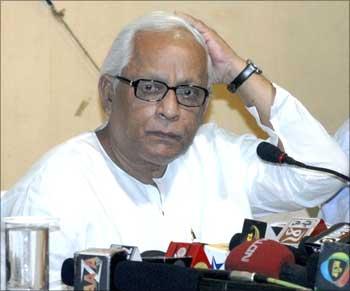 Buddhadeb Bhattacharjee on Friday stepped down as West Bengal chief minister following the Left Front's drubbing in the Assembly election at the hands of the Trinamool Congress-Congress combine that saw the collapse of the 34-year-old red bastion.
Buddhadeb Bhattacharjee on Friday stepped down as West Bengal chief minister following the Left Front's drubbing in the Assembly election at the hands of the Trinamool Congress-Congress combine that saw the collapse of the 34-year-old red bastion.
Bhattacharjee's resignation brought to an end the longest communist rule in India since 1977. Succumbing to the Mamata wave, Bhattcharjee himself trailed much behind Manish Gupta, state's former chief secretary, in his Jadavpur constituency.
The 66-year-old Communist Party of India-Marxist politburo member, who faced the toughest electoral battle in his political career, succumbed to the 'strong winds of change' and failed to steer the Front to victory for the eighth time in a row in West Bengal.
Known to live a spartan life, the dhoti-kurta clad Bengali Bhadralok with a clean image, Bhattacharjee, a connoisseur of art and music, never moved out of his two-room government flat on Palm Avenue in south Kolkata during his tenure as chief minister.
Bhattacharjee took over from his mentor Jyoti Basu when the latter finally decided to step down as the country's longest-serving chief minister on health grounds in November 2000, ahead of the assembly elections in 2001 and led the Left Front to victory. In 1999, he was deputy chief minister of the state.
After leading the Front to a landslide victory with 235 out of 294 seats in the assembly election in 2006, Bhattacharjee embarked on a mission of fast forwarding the industrialisation process in the state inviting national as well as foreign companies to set up factories.
His slogan, 'Do it now', symbolised his resolve to rejuvenate West Bengal which lagged behind many other states. Aggressively pushing his pro-industry stance, he strived to be the architect of modern Bengal. One of his first
achievements after taking over as the chief minister of the seventh Left Front government, was to sign an agreement with the Tatas to set up a Nano car unit at Singur. Ironically, Singur and later Nandigram, where land agitations put paid to his industrial dreams, were to become
the Left's nemesis. Handpicked by Marxist icon Promode Dasgupta, Bhattacharjee was elected as a member of legislative assembly from Cossipore in 1977 for the first time when the LF assumed power in the state.
He became the information and cultural affairs minister, in addition to holding the urban development portfolio. In 1996, Bhattacharjee took over the home (police) portfolio. Nephew of revolutionary poet Sukanta Bhattacharya, Buddhadeb played an active role in politics from his college days and was appointed the state secretary of the CPI-M youth wing, Democratic Youth Federation of India.
In 1966, he got the CPI-M's membership and in 1968, Bhattacharjee became a politburo member of the party. His resignation came after the CPI-M's state secretariat meeting which reviewed the Front's poll reverses.







